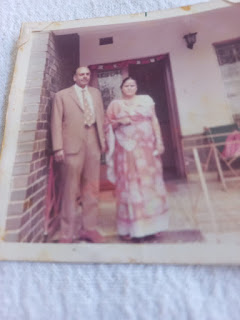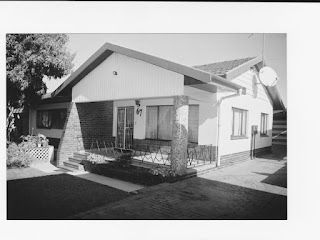MUNOO MAHARAJ AND MANILAL MAHARAJ – DESCENDANTS OF PIONEERING BADRI MAHARAJ FAMILY OF OTTAWA
(Mr Munoo Maharaj with his wife, Suminthra, mother, Mrs Srimathie Badri Maharaj, and eldest son, Krish)
TWO MAHARAJ BROTHERS WHO WERE SOCIAL, RELIGIOUS AND COMMUNITY WORKERS IN OTTAWA
By Subry Govender
Pundit Manilal Badri Maharaj resided, with his wife, Bhanmathy, five
sons and a daughter, on the Old Main Road, Ottawa. The pioneering Ponnen Budda family and Maharaj
family were neighbours.
Pundit Manilal Maharaj
was an esteemed and popular priest who conducted various types of prayers at
weddings, funerals, and other functions.
About two years ago, I had the privilege of interviewing one of his
sons, Mr Suren Maharaj, who is 74-years-old. Mr Suren Maharaj was an archive of
information pertaining to their family history.
During the interview,
at his home, Mr. Suren Maharaj said: “Being a priest was richly ingrained in
the Maharaj family from as far back as when my great-grand-father arrived in
South Africa from a village in North India in the mid-1890s.”
(Pundit Badri Maharaj, the father of Munoo Maharaj and his brother, Manilal, seen here performing the soil turning prayer for the construction of the new Jhugroo school. The lady also performing the prayer was Mrs Sanjaria Jhugroo, who donated the land in memory of her husband.)
His great-grand-father, Pundit Sewnundhan Sharma, arrived in South
Africa, in1890 on the ship, named the SS Umzinto, with his wife, son Badri
Maharaj , and a daughter, Chameli, who passed on at a very early age. They came
from Jhakrasi village in the district of Rai Barelli, near the town of Lucknow,
which is located in the state of Uttar Pradesh in North India.
On his arrival he
stayed on a sugar farm in the Umhlanga Rocks area, which is currently known as
the Hawaan Forest Estate. After a while,
Pundit Sewnundhan Sharma settled in Redcliffe.
(Mrs Srimathie Badri Maharaj(seated) with two of her daughters-in-law and a grand-child)
The young man, Badri
Maharaj, who took over his father’s priestly profession, worked very hard. He
saved most of the “gold crowns” he was paid for his priestly services. Over time he purchased 18 acres of land
between Maharaj and Kissoon Roads, Ottawa, from a Mauritian family. He bought
the land for farming purposes.
His traditional ox
cart travels from his home at the far end of Maharaj Road to the Old Ottawa
Station created a track which was later constructed into a formal road and
named Maharaj Road.
Badri Maharaj married Srimathi Janaki at a young age and they had eight
children – four sons and four daughters.
The eldest son was Parameshwar
Maharaj, also known as Munoo, who lived with his family at the far end of
Maharaj Road. Munoo Maharaj was also one of the local leaders who made a huge
contribution to the construction of the new Jhugroo Primary School
The second son was
Surajnarain Maharaj, who moved to Bolton Road in Overport, Durban.
The third son was
Pundit Manilal Maharaj who was a part-time priest and lived on a property on
the main road in Central Ottawa.
The fourth son is
Harrypersad Badri Maharaj, also known as Dadoo, a school teacher by profession
who is currently 98 years of age and the most senior member of the Badri
Maharaj Family, living in Essendene Road, Overport.
The eldest of the four
daughters was Mrs Soni Maharaj. The second daughter, Sursathi Maharaj, married school
principal, Pundit S S Maharaj. The third daughter was Bhanmathi Maharaj. The
fourth daughter, Chunderwathi Maharaj, was
a polio victim and never married.
Badri Maharaj relocated with his family to Ottawa in 1895 and settled on
the land he purchased. It was here at the far end of Maharaj Road that Pundit
Badri Maharaj built a 10-room wood and iron house. where one of his daughters,
Chunderwathi, lived till the end of her life. The family later sold this
property in the 1970s for the construction of the Ottawa Civic Hall.
In the 1950’s, Badri Maharaj sold two acres of the land to M K Moodley
and D K Moodley of Mount Edgecombe.
Mr Munoo Maharaj, who
played an important role in the construction of the new Jhugroo Primary School
in Tin Town, married Sumintra, who stayed with her family in the historic
settlement of Cato Manor in Durban.
They had 10 children.
They were Kissoonchander, who was also known as Krish; Rajpathie; Minora;
Ramchander who was well known as Rogers; Roopdai; Maganlall; Gayathrie;
Jayanthilall; Parasnath and Ashwin.
The eldest, Krish, who
also worked at Flash Clothing like many other young people of Ottawa, married
Prathima, who was the eldest child of the owner of Flash Clothing, Mr SS
Maharaj.
One of his daughters,
Minora, married Mr SS Maharaj’s youngest brother, Mr DS Maharaj, who was a
school teacher and famous musician for the first band group in Ottawa called
the Young Serenaders. He compiled a song during the school construction.
“Jhugroo School, Jhurgoo School, we are the children of Jhugroo School”.
I spoke to two third generation descendants, Parasnath Maharaj and Suren
Maharaj, about their pioneering fathers, Mr Munoo Maharaj, and Mr Manilal
Maharaj.
According to Parasnath Maharaj, his father, Munoo Maharaj, used to
accompany his father, Badri Maharaj, when he worked as a priest. Mr Munoo
Maharaj, in addition to helping his father, also worked as a sales person at Popatlall
Kara’s sari shop in Durban.
According to Parasnath, his father, who died at the age of 88, was a
very strict person who brought up his children to be respectful to all members
of the family and the community at large.
When I spoke to Parasnath in 2020, he told me that seven of his siblings
were now late and that there were now only three of them. They are Minora, who
is now 82; Rajpathie, who is now 84, and Parasnath, who is now 73.
Recalling his early days, Parasnath said life was tough when they were
growing up. They had no electricity or water at that time.
“I remember we used to fetch our water from the river nearby in big
drums. We used to carry the drums in a long stick called banga.
“Despite our tough lives, the situation was very peaceful and we all
respected one another. We all lived like families irrespective of our different
religious, language and cultural practices.”
According to Suren
Maharaj, his father, Pundit Manilal Maharaj, was a
well-respected member of the community. Pundit Manilal Maharaj’s full-time
employment was in the building industry. Additionally, he was a priest and
Hindi teacher, who volunteered his time at the Shri Gopallal Temple in Verulam.
Mr Suren Maharaj said,
his mother, Bhanmathy, was a disciplinarian. She took great pride in enforcing
the life lessons that Pundit Manilal Maharaj taught their children. She was extremely
hard working and self-motivated in the face of extreme hardship. They ensured
that all their children were well provided for, educated and embarked on
successful careers as adults.
(This is the house that Pundit Manilal Maharaj built for his family in 1963)
Pundit and Mrs Maharaj first lived in a wood and iron house and later Pundit Manilal Maharaj built a brick and tile house which is still occupied by their youngest son and his family on the Old Main Road. Pundit Manilal Maharaj, like his brother Munoo Maharaj, also volunteered his time during the weekends and public holidays in the construction of the new Jhugroo School.
(Suren and Vyas (standing) and seated Raj, Roy and Anil (seated). The photo was taken at the new Jhugroo School.)According to Suren Maharaj, the descendants of Pundit Sewnandan
Sharma now number more than 600 and span over seven generations. Two
grandsons owned garment factories that provided jobs for the residents of
Ottawa; and three others ran their own businesses which have now been passed
onto the younger generation.
Most of the
descendants today have made tremendous progress in their lives. Seven of them
have become attorneys, one advocate, some of them have entered the medical
profession, some the teaching profession and one descendant has entered the
media world by establishing his own independent radio station, Megazone Radio,
on FM and online.
Suren Maharaj said: “Ottawa has been not only a little village where we all lived in harmony
and respect for one another but also participated in all the religious
festivals – such as Diwali, Christmas, Eid and other traditional prayers.
“But life for their
parents and for their generation in Ottawa was challenging yet with
perseverance they overcame these challenges. They had no running
water, electricity or proper roads.
“We washed our clothes on the river banks, fetched water from the river
and picked up wood and coal from the railway lines”.
According to Suren Maharaj
many of them have visited the land of their ancestors over the past 30 years.
He himself has visited India nine times and the village of their ancestors on
two occasions.
“We are South Africans of Indian-origin and cannot forget our roots.”
Ends – subrygovender@gmail.com Updated Dec 4 2023



















,Indranee,Sunny,Velloo%20and%20my%20parents%20seated.jpg)
Comments
Post a Comment